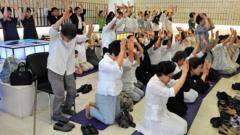The ministry accused the church of pressuring followers into making significant financial sacrifices disguised as religious contributions. Though the church plans to appeal, the court's ruling strips it of its tax-exempt status and requires the liquidation of its assets, while still allowing it to continue operations in Japan.
Authorities conducted interviews with around 200 individuals who reported feeling victimized by the church’s coercive tactics, including the purchase of overpriced goods under the guise of spiritual necessity. The Unification Church, founded in South Korea by Sun Myung Moon in the 1960s, has long faced criticism for its controversial teachings, including the emphasis on marriage as a pathway to salvation.
In a related development following Abe’s assassination, former followers have filed claims for 5.7 billion yen (approximately $38.5 million) in compensation. Investigations revealed extensive connections between the church and conservative lawmakers, prompting the resignation of multiple government officials as revelations surrounding the church's influence shook Japan to its core.
Following the heated investigation, former Prime Minister Fumio Kishida's Liberal Democratic Party (LDP) disclosed that nearly half of its members, 179 out of 379, had links to the church, some ranging from church participation to accepting donations. The uncovering of these ties has forced a national reckoning regarding the church’s significant political sway.
Authorities conducted interviews with around 200 individuals who reported feeling victimized by the church’s coercive tactics, including the purchase of overpriced goods under the guise of spiritual necessity. The Unification Church, founded in South Korea by Sun Myung Moon in the 1960s, has long faced criticism for its controversial teachings, including the emphasis on marriage as a pathway to salvation.
In a related development following Abe’s assassination, former followers have filed claims for 5.7 billion yen (approximately $38.5 million) in compensation. Investigations revealed extensive connections between the church and conservative lawmakers, prompting the resignation of multiple government officials as revelations surrounding the church's influence shook Japan to its core.
Following the heated investigation, former Prime Minister Fumio Kishida's Liberal Democratic Party (LDP) disclosed that nearly half of its members, 179 out of 379, had links to the church, some ranging from church participation to accepting donations. The uncovering of these ties has forced a national reckoning regarding the church’s significant political sway.




















